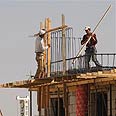
Amid the growing protests across the Palestinian Authority against the dire economic situation and fears that the unrest could snowball into an "Arab Spring" in the West Bank, Israel has decided on a number of measures aimed at preventing the collapse of President Mahmoud Abbas' government.
On Sunday the socio-economic cabinet is expected to authorize the entry of an additional 5,000 Palestinian workers into Israel. A similar number of work permits were issued about two and a half months ago.
Related articles:
- PA warns Israel logjam threatens statehood
- World Bank: PA fiscal crisis deepening
- Palestinian price protest turns violent
Israel has also decided to move up the first phase of the economic agreement signed between Finance Minister Yuval Steinitz and Palestinian Prime Minister Salam Fayyad and allow the PA to immediately begin collecting customs duties and valued-added tax on goods delivered to the West Bank via Israeli ports.
The agreement also calls for building pipelines that will carry fuel from Israel's ports directly to special warehouses in the PA. Fuel is currently delivered to the Authority aboard trucks.
It appears that Prime Minister Benjamin Netanyahu's government hopes the measures will help quell the protests against the high cost of living in the West Bank by showing the Palestinians that Abbas' Western-backed regime has more economic sovereignty.
Israel's security establishment said it had recommended the measures in order to strengthen the Palestinian economy.
As part of this effort, Fayyad recently announced a package of subsidies and tax cuts. The Palestinian PM said he will cancel a series of price hikes in fuel and cooking gas. He told a media conference he also plans to lower a sales tax and said he would fund the subsidies by cutting the salaries of government ministers and other top officials.
In light of the economic slowdown, a Palestinian delegation is due to arrive in New York on Sunday for a meeting of donor nations. The PA officials will present a report according to which its economy is on the brink of collapse due to Israel's policy in the West Bank.
The officials will demand that Israel remove obstacles they claim are blocking foreign investment in the PA. The delegation is also expected to ask for more financial assistance from the donor nations.
The report states that Israel's use of the PA's natural resources and the geographical fragmentation of Area C due to the expansion of Jewish settlements, the confiscation of lands and demolition of homes hinder the Authority's efforts to develop the region.















